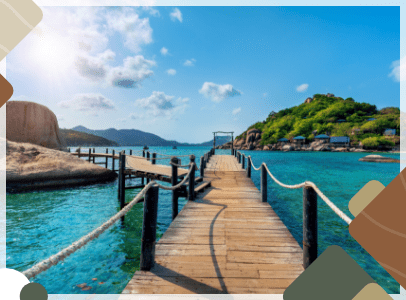
If you are only visiting the Caribbean for a holiday, you can normally rely on your travel and health insurance policies to take care of any out-og-pocket medical expenses you may incur. But what about if you decide to live and work on an island in the Caribbean? What should you do about healthcare in such a situation? Well, if you are in the process of looking for work in the Caribbean and would like to make sure your medical expenses are fully covered for the duration of your stay, our expat guide to healthcare in the Caribbean is sure to come in very handy. In it, we discuss the most import factors to consider and how the healthcare sector varies from one country to the next in this part of the world.
How to Navigate Healthcare When Working as an Expat in the Caribbean
No matter where you are based when working in the Caribbean, it’s safe to say that you will definitely need comprehensive healthcare insurance. While there are some free health services available in certain locations, they are few and far between and the quality of care provided in such facilities is quite variable. Depending on your exact location, you may also need to make other provisions, as we discover in our whirlwind Caribbean tour below:
- The Bahamas – As a well-established international holiday destination and a favourite among well-heeled expats, The Bahamas has excellent healthcare facilities of a standard that will meet the expectations of even the most demanding of patients. In common with many Caribbean destinations, it is sometimes easier to pay for healthcare services with cash in The Bahamas, even if you have fully comprehensive cover in place. With this in mind, we recommend keeping a generous sum available for use in an emergency.
- Jamaica – With a couple of dozen public hospitals and around ten private medical facilities, Jamaica has a relatively wide choice of healthcare options available to expats and holidaymakers. The only problem is standards vary widely from one facility to another, which means it;s important to do your research before choosing a specific hospital or clinic to undergo treatment. If you are planning to make a new home in this part of the Caribbean, we recommend a comprehensive healthcare insurance policy and a lump sum of cash ready for emergency treatment. You may also wish to consider making provisions for repatriation in the event of a serious illness or injury.
- Cuba – As you might expect from a country with a thriving medical tourism sector, Cuba has some of the best private healthcare facilities anywhere in the Caribbean. If you have a comprehensive international insurance policy, along with a decent amount of cash use as an emergency treatment fund, your time in Cuba. However, as any veteran who has been navigating healthcare as an expat working on the Caribbean for some time will be able to tell you, it is sometimes difficult to obtain pharmaceutical supplies in this part of the world. Some medications, which are freely available elsewhere, can be almost impossible to find in Cuba. We therefore strongly urge you to make the necessary arrangements before your arrival if there is any medication that you cannot be without for any length of time.
- Dominican Republic – If you happen to be close to a decent private hospital, you can look forward to an excellent standard of care in the Dominican Republic. On the other hand, if you are not within easy reach of such a facility, you may find the standard of care you receive to be less than acceptable, especially if you have moved here from a developed country such as the USA, Australia, UK, Canada or anywhere in Western Europe. In common with the other destinations in this list, you will need comprehensive health insurance at a minimum, with an emergency repatriation fund highly recommended.
- Antigua and Barbuda – Whilst the capital city, St John’s, is home to what is widely considered to be the most modern hospital in the Caribbean, standards are considerably lower in other areas of the country. In addition to a decent insurance policy, we suggest keeping aside enough cash for a private flight to St John’s from wherever you happen to be staying if it’s not in the capital, as well as a fund or policy that will allow you to be repatriated in the event of a genuine medical emergency. Administratively, Antigua and Barbuda are divided into six separately governed medical districts, which means the type and standard of care you are likely to receive may vary from one part of the country to another.
- Cayman Islands – The Cayman Islands is home to many wealthy expats and is home to many excellent private hospitals and clinics. There is also a fully functioning public healthcare system operating in the islands but as an expat, you will still need insurance to access the services that are offered by the public healthcare system. Public healthcare services are, of course, significantly cheaper than those offered by private facilities in the Cayman Islands but if your insurance policy provides adequate cover, there is no reason why you should choose a public hospital over a private one in this part of the world. If you do, you will find yourself having to contend with long waits for basic services and an overall lower standard of care than equivalent private facilities. As basic healthcare insurance is mandatory for all residents, you will have to have some form of cover in place for when you arrive.
- Belize – Although it has a Caribbean coastline and is less than two hours flight time from Jamaica, Belize is best considered as the Central American nation that it is when appraising healthcare options. All residents, whether native or expatriate, are entitled to free medical care from government hospitals and clinics in Belize. Unfortunately, the standard of care on offer is not always acceptable to visitors from overseas, which is why we strongly recommend not just a comprehensive insurance policy but a repatriation plan too. If you find yourself facing a serious medical issue, such as cancer or cardiovascular disease, you will probably want to be treated in your home country rather than in Belize. Having said that, if you are currently in good health and planning to continue leading a healthy lifestyle while in the country, you may well find the medical services offered by local doctors to be good enough to meet your basic needs.
If you are planning to live and work in an area of the Caribbean that we have not covered in the above list, we recommend that you formulate a custom healthcare plan by following the instructions in the next section.
Creating Your Own Custom Caribbena Healthcare Plan

To finish off our expat guide to healthcare in the Caribbean, we’re going to provide a framework that you can use to create your own personalised medical plan while living here. You can use this template no matter where you plan to stay.
- Do Your Homework – The more information you have on the local healthcare system, the easier it will be for you to formulate a practical plan that covers all your needs while working in the Caribbean. Consult other expats, local professionals and anyone else who you think may have the information you need. The more thorough your research, the less likely you are to overlook any important considerations.
- Establish a Relationship With a Local Doctor – The best way to ensure you are seen by the most competent medical professionals whenever necessary is to develop a good relationship with a respected doctor who operates in the area you will be staying. This first step on the path to receiving the care you need is often the most important and decisive as far as the final outcome is concerned.
- Consider Maintaining an Emergency Medical Evacuation Fund – If you are not heading for one of the countries mentioned in the previous section, there is a good chance that you will need to maintain an emergency medical repatriation fund for the duration of your stay. Such a fund will allow you to elect to return to your home country or another country of your choosing when faced with a serious medical emergency while working in the Caribbean. Obviously, if you suffer a cardiac arrest or similar, you may not be able to fly anywhere. However, if you are diagnosed with cancer or suffer from a stroke, an emergency fund could give you the choice of going home to receive the care you need.
- Take Preventative Healthcare Measures – If you are going to be living somewhere with less than stellar healthcare, be sure to take preventative measures. These measures may include vaccinations, a sensible diet and a workable exercise routine.
- Build a Support Network With Local Expats – One of the easiest ways to get a head start when it comes to navigating healthcare as an expat working in the Caribbean is to build a network of locals and expats, who you can turn to in the event of an emergency.
With a little preparation and a practical, focused approach, you can easily organise acceptable healthcare for your stay in the Caribbean. And if you are still looking for the perfect job here, don’t forget to check out our finance jobs for expats in the Caribbean to see what is currently available.

